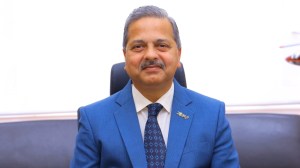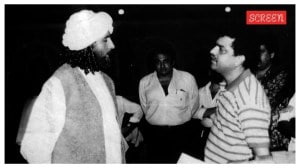Father, son and an unholy silence
This time, at least, the Centre didn’t allow the Abdullahs to walk away into the sunset, their demands fulfilled and their bargaining c...

This time, at least, the Centre didn’t allow the Abdullahs to walk away into the sunset, their demands fulfilled and their bargaining chips intact.
Despite all the hectic lobbying, Abdullah senior neither got the Vice-President’s post nor a ministry in the revamped Cabinet. And Abdullah junior now has to rub shoulders with another minister of state—Digvijay Singh—in the External Affairs ministry.
The way the Centre has handled the Abdullahs, who had yet again started using the autonomy proposal as a pressure tactic, has surprised the party. In fact, the NC’s main political demand—the restoration of autonomy—has been reduced to something of a joke in the Valley, a stick that’s wielded when it pleases the Abdullahs in return for their demands.
But if there were any red faces going around in the National Conference, it wasn’t evident. Any decision on the party’s relations with the Centre has remained the exclusive prerogative of the two Abdullahs, and the party leadership has no voice in this crucial area.
‘‘We would have loved it if the National Conference snapped ties with the NDA on the very day that our autonomy resolution was rejected. But it never happened,’’ said a senior party leader said, who preferred anonymity to inviting the wrath of the Abdullahs. ‘‘It would have improved our credibility and helped us to reach out to an absolutely alienated public. But our leader is obsessed by the idea that the NC can’t do anything if it takes a position against the ruling party in Delhi.’’
|
NC workers are terrified by the killings of their colleagues and worried over the negation of the party image as a secular regional force. “The erosion of our party’s basic ideals has given us a much more severe blow than even the massacre of our partymen,’’ says an NC leader |
The Gujarat riots gave the NC an honourable exit line, he added. ‘‘But there too, our priorities were not dictated by party interests but by something else’’. But no NC leader is standing up in party forums and asking tough questions from the leadership. Rather, NC activists down the line are easy targets for militants as they go about dismantling the infrastructure of mainstream political parties.
The NC activist who was shot dead on July 2 was the sixth party worker to be killed since Omar Abdullah’s ‘coronation’ in Srinagar on May 23. The National Conference has already lost 1,200 functionaries—the majority of them block presidents. The casualties include minister Ghulam Hassan Bhat, a former Speaker of the State Legislative Assembly, Wali Mohammad Yatoo, senior leader and former MP Moulana Mohammad Sayeed Masoodi as well as 23 sitting and former legislators bullets since the emergence of militancy.
Though terrified by the killings of their party colleagues, the biggest dilemma for the National Conference remains the way the leadership has eroded its image of a Kashmir-based secular party with a strong regional manifesto. ‘‘Our workers are being killed for their political beliefs and party affiliation. The killings are aimed at hitting the morale of our men and scaring them away from political activities,’’ a senior party leader told The Indian Express. ‘‘But frankly, the erosion of our party’s basic ideals and policies has given us a much more severe blow than even the massacre of our partymen.’’
He claimed that ‘‘our biggest enemy is not the gun wielding militant but the party policy.’’ The first big blunder, he points out, was the party’s electoral alliance with its arch-rival, the Congress, in 1987. ‘‘This alliance eroded our regional character because power, rather than political identity, became the focus. And then we joined the BJP, a political disaster. The BJP is antithetical to us, its ideology revolves round abrogation of Article 370 and an anti-autonomy stance,’’ said the leader.
And as Farooq Abdullah moved away from his father’s legacy and entered into a string of alliances to keep his power intact, the NC’s sole attraction became its continuance in government. In fact, the NC’s cadre comprises party workers who signed up during the days of Sheikh Mohammad Abdullah and who still see it as the party responsible for revolutionary land reforms and a socialist vision of a ‘Naya Kashmir’. Then, there are those who’ve joined the party simply because it’s in power.
Omar Abdullah admitted as much during his first address as NC president, when he said Kashmiri youth were suspicious of the party. Though hopes and hype are riding high on him, the question is: will he come to the aid of the party or the Centre?






- 01
- 02
- 03
- 04
- 05

























